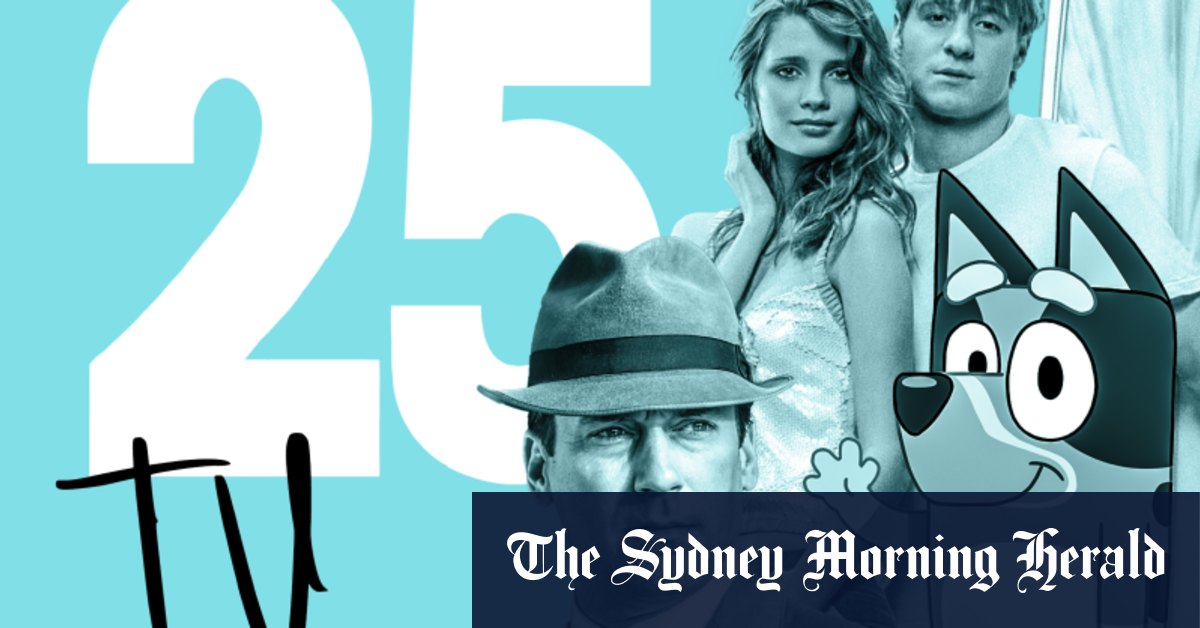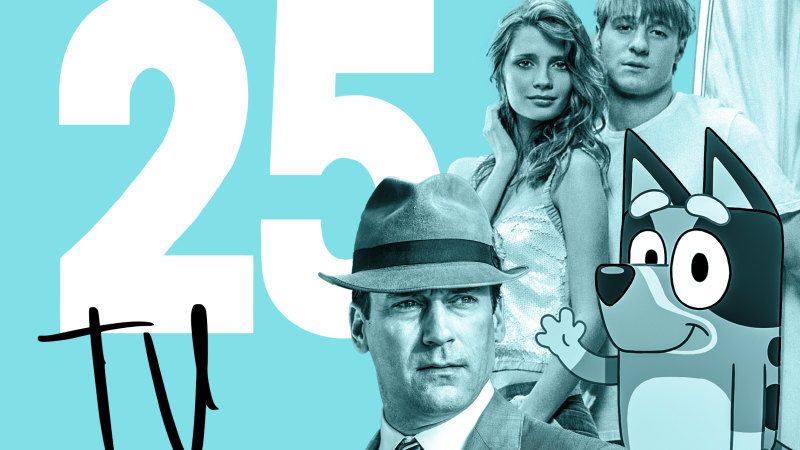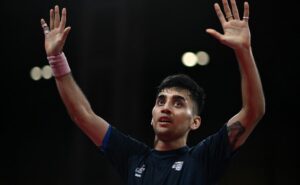

At times, choosing a top 10 list of TV shows from across the last 25 years felt like an impossible mission. This is a period that took in prestige TV’s golden age, the rise of reality TV from Big Brother to The Real Housewives and iconic shows that spawned endless copycats and whole genres unto themselves (The Office, we salute you). But our critics – judging on criteria such as impact, quality and legacy, and limited to series’ whose first episodes debuted pre-2000 (this ruled out The Sopranos) – came through with a final list that covered acclaimed classics, long-running favourites, and brief-but-influential flashes of small-screen genius. What did we miss?
Curb Your Enthusiasm (2000–2024)
Nary a day goes by when I don’t think to myself, “this could be an episode of Curb Your Enthusiasm”. In fact, I could imagine Larry David bringing his genius brand of observational humour to an episode about the proper use of the word “nary”. David’s face was perfectly scrunched into a question mark for most of the 120 episodes over 12 seasons of Curb Your Enthusiasm as he tried to make sense of everything in life that, when you look into it, makes no sense. HBO’s longest-running and most celebrated comedy (55 Emmy nominations), Curb had a sensational supporting cast including the long-suffering Cheryl David (Cheryl Hines) and the affable confidant Jeff Greene (Jeff Garlin) as well as legendary cameos from Jon Hamm, David Schwimmer, Sienna Miller, Alanis Morissette and Salman Rushdie (to name a few). Melanie Kembrey
Survivor (2000–)
Survivor is perfect reality TV. It harnessed the physical competition of Gladiators, but subbed in ordinary people to root for in extraordinary situations. It took the real-life drama of strangers living together in The Real World and escalated it by introducing a complex game of social strategy. In a world of confected drama and villain edits, Survivor has always felt the closest to “real” reality TV. And with increasingly savvy contestants granted so much agency throughout (for many, it’s now a lifelong dream to play), it never feels grubby or exploitative. Is the US franchise still the best? It’s arguable. There are now dozens of international versions, and plenty of people – myself included – would make a case for Australian Survivor. But the show is undeniable as a bedrock of the genre, and it continues to innovate almost 50 seasons in. What other show on this list spans the entirety of the past 25 years? Jeff Probst has been torturing people on beaches for a quarter of a century – and we’re all richer for it. Meg Watson
The Wire (2002–2008)
All the great stories – even the fictional ones – are true stories. Creator David Simon was a reporter for The Baltimore Sun and turned his experiences on the police and city beats into one of the most compelling TV series of all time. With truly groundbreaking cinematography from Uta Briesewitz and music by Tom Waits, the series tackled, in different seasons, layers of the city from its port system and illegal drug trade to the print newspaper world that served as Simon’s origin story. The performances are stunning: Dominic West as Detective Jimmy McNulty, drug addict and police informant Bubbles (Andre Royo), ambitious politician Tommy Carcetti (Aidan Gillen) and drug kingpin Stringer Bell (Idris Elba) among them. And the writing – from Simon, George Pelecanos, Ed Burns, Richard Price, Dennis Lehane and others – is without peer. Michael Idato
Mad Men (2007–2015)
Unlike anything before it or since, Matthew Weiner’s superbly stylish drama burst onto TV screens in 2007, defying conventional wisdom about what it takes to make a hit. Set in the early ’60s at a Manhattan advertising agency, the show lacked headline-grabbing stars and screened in the US on a largely undistinguished basic cable channel. The meticulously crafted series announced itself as the work of an auteur who knew exactly what he wanted, down to the last crystal tumbler and ashtray. And the core cast, including Jon Hamm, Elisabeth Moss, Christina Hendricks and John Slattery quickly became household names. Gripping and unpredictable through seven seasons, the series chronicled the lives of the company’s staff, pivoting on the exploits of the talented, troubled, philandering executive Don Draper (Hamm). Married to the beautiful, blonde Betty (January Jones), he endeavoured to keep his home and work lives separate. Masterfully evoking a smugly masculine, viciously cutthroat workplace, the series forced a reflection on the not-too-distant past: the callous treatment of women, the casual smoking and drinking, the family picnic where the Drapers head back to their car, leaving discarded rubbish without a backward glance. Whether the focus was the toxicity of the workplace or the tensions in the Draper household, Weiner’s masterwork was surprising, intriguing and utterly absorbing. Debi Enker
Breaking Bad (2008–2013)
Bryan Cranston’s journey from defeated high school chemistry teacher Walter White to brutal drug lord Heisenberg (“I am the one who knocks”) might still be TV’s most chilling transformation. Cold, cunning and ruthless, Cranston’s Everyman was a Scarface for the post-GFC era, brought down by fate and hubris, while his partner-in-crime/naive victim Jesse Pinkman, played with off-kilter unpredictability by Aaron Paul, brought the sort of emotional intensity that could break your heart. There was madness in all the meth(od), too: beyond the epic storytelling, Breaking Bad gave us head-cracking tonal shifts and gonzo televisual experimentation, such as director Rian Johnson’s Fly – modern TV’s greatest achievement (well, after Part 8 of Twin Peaks: The Return). By the time it wrapped, the series had claimed 12 Emmys (including four for Cranston and three for Paul) and still spawned another all-timer in Better Call Saul. Robert Moran
Girls (2012–2017)
In the pilot of Girls, protagonist Hannah Horvath, a 20-something aspiring writer, tries to convince her parents not to cut her off. “I think I may be the voice of my generation. Or at least, a voice of a generation,” she says. More than a decade since we first heard these words, Lena Dunham – the show’s creator who also portrayed Hannah – may not have been so far off. This declaration, a nod to Millennials’ self-entitled reputation, set the tone for the six-season show: sharply written, hilarious and always self-aware. Girls was widely flaunted as Millennials’ response to Sex and the City, following four friends in a post-9/11 New York through messy relationships, bad sex and countless identity crises. Largely autobiographical, Girls drew criticism for its lack of diversity and privileged viewpoint. But over seven years since its finale aired, it continues to invite debate both on and off-screen over its characters and musings on Millennial life. And isn’t that what good TV does? Lauren Ironmonger
Fleabag (2016–2019)
A woman looks into the bathroom mirror of a fancy restaurant, mopping up the blood streaming from her nose. She takes a breath and turns to the camera. “This is a love story,” she says, grinning. The season two opener of Phoebe Waller-Bridge’s Fleabag sums up the thesis of the show deliciously. Both seasons are essentially love stories: how to love yourself when you’ve done bad things, struggling to understand the people you know you’re meant to love, being haunted by past relationships, and exquisitely agonised by loving people you shouldn’t. Fleabag is about love, but creator, writer and star Waller-Bridge is incisive enough that it may leave you bloodied in the end. The show crept up on the culture until, suddenly, it was ubiquitous – everyone knew who “Hot Priest” was, for instance, much to Andrew Scott’s bashfulness. Despite the fractured TV landscape, it only took 12 operatic episodes for “fleabag” to become the shorthand for any disastrous person in their 30s. It was a star-making performance for Phoebe Waller-Bridge, who crunched the fourth wall in her teeth and dared you to stare back at her. Sinéad Stubbins
Succession (2018–2023)
A great man once said, “Life is not knights on horseback; it’s a number on a piece of paper; it’s a fight for a knife in the mud.” He also said “F— off” quite a fair bit. We are, of course, referring to Succession patriarch Logan Roy. Such terrifying wisdom was part of Logan’s charm, and it’s no exaggeration to say that he and his bunch of awful children, Shiv, Kendall, Roman and Connor (all deeply unserious people), were the best thing to happen to television since The Sopranos. HBO has long been home to TV as high art, but even by their lofty standards, Succession rewrote the rule book. Across four seasons, creator Jesse Armstrong lifted the veil on the one per cent, revealing them to be both grotesquely unrelatable yet as flawed as the rest of us. It’s no surprise Succession was an awards darling (it scooped the Outstanding Drama Series at the Globes and Emmys in 2020, 2022, and 2023), but it also blessed us with enough one-liners to last a lifetime. Long live Succession and the ludicrously capacious bag. Thomas Mitchell
Bluey (2018–)
No disrespect to wool and iron ore, but Australia’s finest export is Bluey. Since its ABC debut in October 2018 – “happily put your young viewers in front of it,” I wrote in this masthead at the time – the animated preschool television series has conquered the world. In a genre where marketing potential dictates content, creator Joe Brumm’s marvellous anthropomorphic adventures of now seven-year-old blue heeler Bluey, younger sister Bingo, dad Bandit, and mum Chilli are the gold standard. The standard episode is approximately seven minutes in length, but each is a marvellous celebration of creative play and sometimes difficult learning that unfolds in a Brisbane home and a backyard shaded by a royal poinciana tree. The show matters for an audience of any age, grounded in naturalistic voice performances that can sometimes sound like field recordings. There are currently 154 episodes of Bluey, each a model of economy and empathy. Here, the divide between amusement and lesson is minimal. That’s a straight-up masterpiece. Craig Mathieson
Fisk (2021–)
Loading
It may seem odd to choose a comedy that is only three seasons deep and only started in 2021, but Fisk represents more than the sum of its parts. That it was a comedic triumph from the get-go – revelling in probate lawyer Helen Tudor-Fisk’s uptight personality and her eccentric-yet-goodhearted colleagues (Roz, Ray and webmaster George) at the Melbourne law firm Gruber & Gruber – only tells part of the story. Creator and star Kitty Flanagan (who writes the show with her sister Penny) had to fight for years to get a show made. Despite being an award-winning stand-up comedian and actor, it was only after she wrote her best-selling book 488 Rules for Life that she was taken seriously enough to be given her own show. That says a lot about the hurdles women have to jump to prove they can succeed on TV. Fisk is now an international hit – an award-winner in France and popular on Netflix in the US – and, thankfully, it’s also very, very funny. Bring on the celebratory mud cake! Louise Rugendyke
Honourable mentions
The O.C. (2003–2007)
Keeping Up With the Kardashians (2007–)
Nathan For You (2013–2017)
Mr Inbetween (2018–2021)
I May Destroy You (2020)
What TV shows do you think deserve a place on the list? Tell us in the comments.



